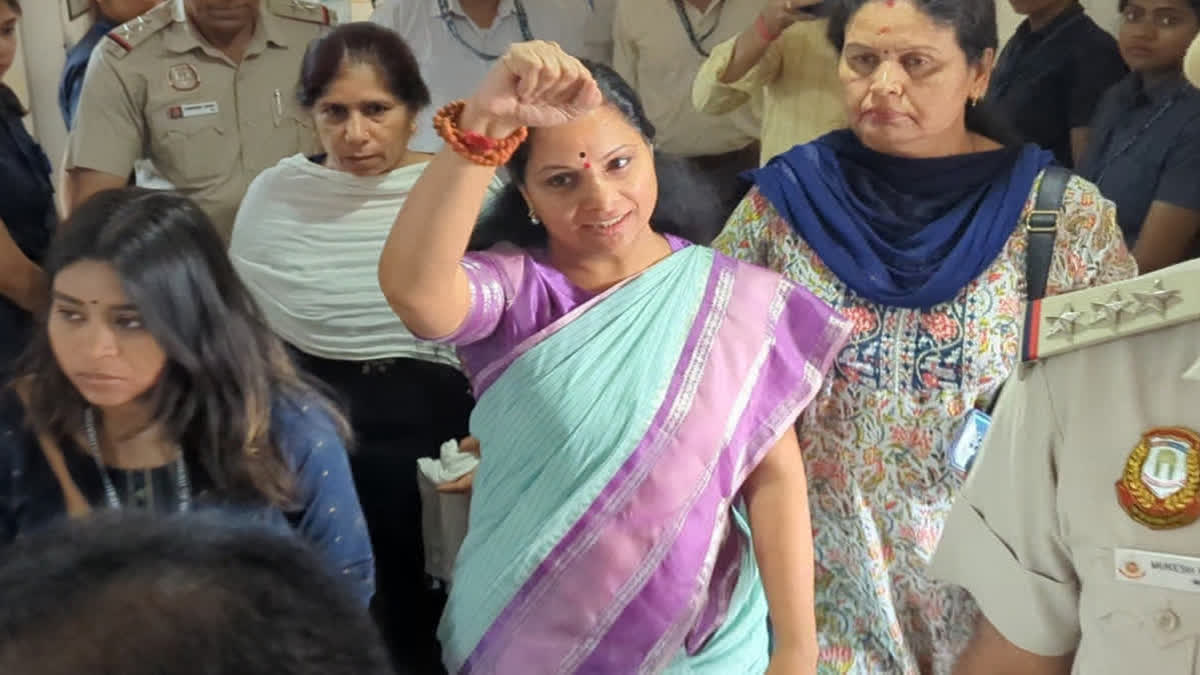New Delhi: The Supreme Court on Tuesday granted bail to BRS MLC K Kavitha in the alleged Delhi excise policy case, and she was released from Tihar jail. While granting the bail, the apex court made strong observations against the central agencies, CBI and ED, in connection with the nature of the probe being conducted in the case.
Kavitha, daughter of former Telangana CM K Chandrasekhar, has been in custody since March this year. Citing the bail granted to former deputy chief minister of Delhi Manish Sisodia in the same matter, the apex court said as observed in Sisodia's case, the likelihood of trial being conducted in the near future is impossible.
A bench comprising Justices B R Gavai and K V Viswanathan noted that the investigation is complete in the matter and the custody of the appellant is not necessary for investigation.
Pulling up the central agencies on the nature of the probe, the bench noted that the agencies relied on the statements of co-accused who had been granted pardon and made approver. The apex court stressed that the probe should be impartial and the investigating agency should not be unfair.
The apex court set aside the Delhi High Court, which denied her bail. The apex court said Kavitha should be forthwith released on bail in CBI and ED cases. The apex court made it clear that it did not observe anything in connection with the merits of the matter.
Granting bail to Kavitha, the apex court observed that she has been behind bars for 5 months and, citing various pronouncements of the apex court, added that the undertrial custody should not turn into a punishment.
The bench noted that the appellant is entitled to beneficial treatment available to women under the proviso to Section 45 of the Prevention of Money Laundering Act (PMLA). The top court expressed its discontent with the observations made by the High Court, denying her bail, that an educated and sophisticated woman is not entitled to bail under the beneficiary provision for women under PMLA.
The bench observed that if this order were to become law, these perverse observations would mean no educated woman can get bail. “It would apply at least to all courts in the jurisdiction of Delhi. What is this?”, Justice Gavai observed during the hearing.
The apex court said that this High Court order saying that the bail to a woman cannot be granted just because she is educated and independent is perverse and has to be quashed. Justice Gavai said that courts should not differentiate between a common person and an MP, but here the High Court is finding an artificial differentiation, which is not there in the statute.
The apex court ordered Kavitha to be released on bail, and furnishing a bail bond of Rs 10 lakhs each in both CBI and ED cases. The apex court stressed that she should not tamper with the evidence or influence proceedings. The bench directed her to surrender the passport and also report to the investigating agency regularly. Senior advocate Mukul Rohatgi represented Kavitha and additional solicitor general S V Raju represented the central agencies.
On August 12, the top court sought a response from the CBI and the ED on Kavitha's pleas challenging the Delhi High Court's July 1 verdict denying her bail in the two cases. Kavitha has denied all allegations.
The central agencies have lodged separate cases pertaining to alleged corruption and money laundering in the formulation and implementation of the policy. Kavitha was arrested by ED from her Banjara Hills residence in Hyderabad on March 15. The CBI arrested her on April 11 from Tihar jail in connection with the corruption case.
Meanwhile, the Delhi High Court reserved its order on the bail plea filed by Arun Pillai, a close aide of K Kavitha.
Read More



